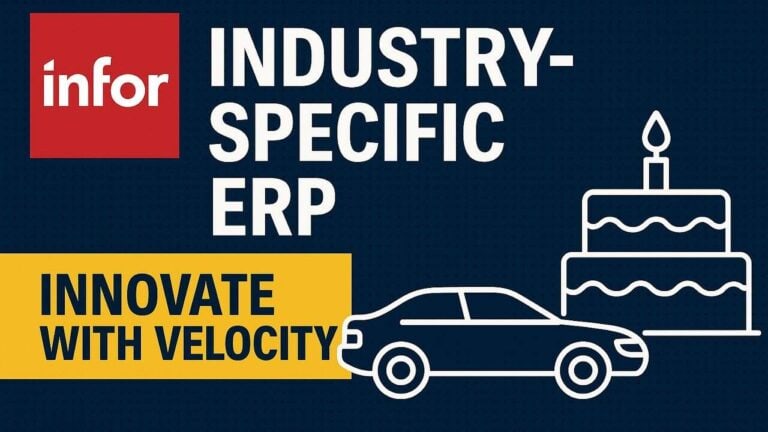Infor takes a fundamentally different approach to ERP by rejecting the one-size-fits-all model in favor of industry-specific solutions. Phil Lewis, SVP of Solution Consulting, reveals how this strategy, combined with their new Velocity Suite, addresses the growing gap between technology expectations and reality.
Unlike traditional ERP vendors, Infor believes that a company making sports cars has completely different requirements than one baking cakes. This philosophy drives their dual-core approach:
ERP LN serves discrete manufacturing industries, including automotive, aerospace, and defense. Developed initially by the Dutch BAAN organization, LN remains the core for all discrete cloud suites today.
ERP M3 handles process manufacturing; brewing, baking, dairy, chemicals, and fashion distribution. Founded in Sweden, M3 provides specialized capabilities for industries that require different operational approaches.
Also read: Infor Now 2023: Industry-specific ERP, now with RPA
Micro-verticals drive deeper specialization
Even industry-level specificity isn’t enough. Within food and beverage alone, dairy operations differ significantly from brewing or baking. Infor addresses this through micro-verticals – specialized templates that typically cover 90% of a customer’s needs (60% industry-standard, 30% micro-vertical specific, 10% customer-specific).
Before implementation, customers go through an “engage process” where Infor maps their requirements to the most suitable Industry Process Catalog (IPC). This ensures customers adopt proven best practices rather than building custom solutions.
Cloud-native architecture powered by AWS
Infor’s 11-year partnership with AWS goes far beyond simple hosting. Their cloud suites utilize 100-130 AWS services, making them truly cloud-native rather than just “on the cloud.” This deep integration means customers cannot run Infor solutions on other platforms, such as Azure, they’re hardwired to AWS infrastructure.
The company started its cloud strategy in 2014, launching its first multi-tenant cloud suite in 2017. This wasn’t a rushed response to market trends but a deliberate, long-term architectural decision.
Data fabric: 10 years in the making
Infor’s data fabric predates current industry buzzwords by a decade. Built on AWS S3, it captures every transaction through Business Object Documents (BODs) using OAGIS standards. This creates a comprehensive data lake that contains not just ERP data but also warehouse management, supply chain, HR, and even unstructured data such as PDFs and spreadsheets.
This architecture enables powerful analytics, business intelligence, and AI capabilities across the entire business ecosystem rather than siloed applications.
Velocity Suite: bridging the value void
Infor’s research of 3,600 companies across 14 countries revealed a “value void”; the gap between technology expectations and reality. While 74% believe advanced technology will drive value, and 98% expect GenAI to transform their business, only 30% actually realize these benefits.
Three main barriers prevent success:
- Not knowing where to start
- Overwhelming technology landscape
- Lack of specialized skills (data scientists, algorithmic specialists)
Diagnose, automate, optimize methodology
Velocity Suite addresses these challenges through a simple three-phase approach:
Diagnose: Process mining analyzes actual system usage versus intended processes, identifying non-conforming cases and bottlenecks. For existing cloud customers, this capability is already active and ready to use.
Automate: A pre-built catalog of automation flows addresses common business processes. For example, invoice processing automation delivers proven 72% increases in productivity. If solutions don’t exist in the catalog, Infor’s services team creates custom automations.
Optimize: AI capabilities, including machine learning, digital assistants, and generative AI, further enhance processes identified through the diagnosis phase.
Ready-to-use advantage
The key differentiator isn’t just having AI, RPA, or process mining tools; it’s having them pre-connected to your business processes, data, and security frameworks. Customers avoid the typical overhead of integration, data structuring, and security configuration that plague standalone solutions.
This consumable approach means customers can start gaining value within days rather than months, making advanced technology accessible to manufacturers who are experts in their industries, not data science.
